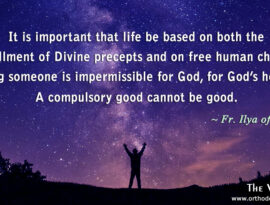 by Chris Banescu –
by Chris Banescu –
Most of recorded human history points to the reality of the Moral Law, written in our hearts, that governs the affairs of men. Since the beginning of time mankind has recognized (more definitively and clearly in some ages and civilizations than others) that universal concepts of right and wrong and good and evil do in fact exist.
We acknowledge this timeless truth every time we judge whether a person’s behavior is just or unjust, right or wrong, or good or evil. We make this determination not by claiming that a specific act is only “good” if we subjectively like and agree with it, but rather by comparing it with an actual standard of good and evil. Such an evaluation is logical only if these standards are real and absolute, otherwise it would make no sense in labeling anything as evil or good. How could we possibly say that the Nazis and the Bolsheviks were evil and rightly denounce ISIS and Al-Qaeda as wicked and depraved organizations?
If evil is real, there must be a fixed standard of good to compare it against. If good exists, there must be a real, transcendent, and absolute standard of goodness by which we all measure it.
But, is goodness only good because God commands it or is goodness an independent standard outside God’s dominion? In other words, would any act, no matter how atrocious it is, be deemed “good” simply because God commands it? Or, is there a moral absolute, separate and independent from God, that He abides by, thus commanding only what is good according to that timeless standard?
C.S. Lewis addresses this mystery when he explains: “God is not merely good, but goodness; goodness is not merely divine, but God.”
“When we attempt to think of a person and a law, we are compelled to think of this person either as obeying the law or as making it. And when we think of Him as making it we are compelled to think of Him either as making it in conformity to some yet more ultimate pattern of goodness (in which case that pattern, and not He, would be supreme) or else as making it arbitrarily by a sic volo, sic jubeo [I want this, I order this] (in which case He would be neither good nor wise).
God is not merely good, but goodness; goodness is not merely divine, but God.
But it is probably just here that our categories betray us. It would be idle, with our merely mortal resources, to attempt a positive correction of our categories … But it might be permissible to lay down two negations: that God neither obeys nor creates the moral law. The good is uncreated; it never could have been otherwise; it has in it no shadow of contingency; it lies, as Plato said, on the other side of existence. It is the Rita of the Hindus by which the gods themselves are divine, the Tao of the Chinese from which all realities proceed.
But we, favoured beyond the wisest pagans, know what lies beyond existence, what admits no contingency, what lends divinity to all else, what is the ground of all existence, is not simply a law but also a begetting love, a love begotten, and the love which, being these two, is also imminent in all those who are caught up to share the unity of their self-caused life. God is not merely good, but goodness; goodness is not merely divine, but God.
These may seem fine-spun speculations: yet I believe that nothing short of this can save us. A Christianity which does not see moral and religious experience converging to meet at infinity, not at a negative infinity, but in the positive infinity of the living yet superpersonal God, has nothing, in the long run, to divide it from devil worship; and a philosophy which does not accept value as eternal and objective can lead us only to ruin.” ~ C.S. Lewis
Excerpts from “The Poison of Subjectivism” essay by C.S. Lewis.




